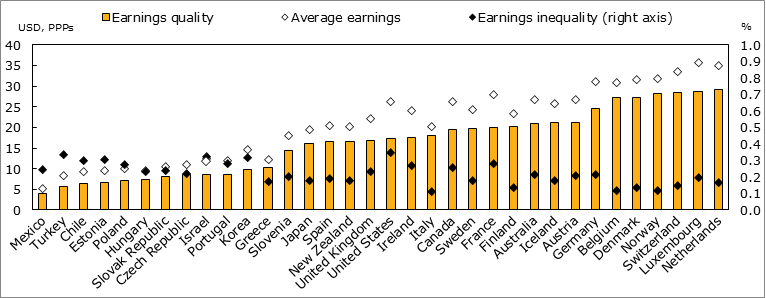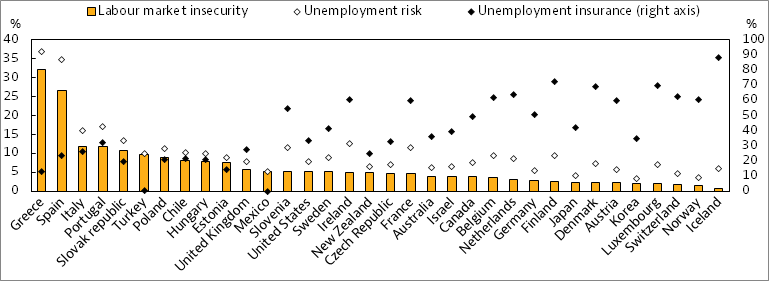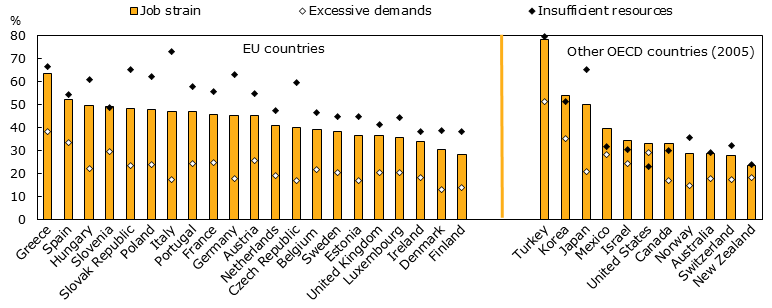Employment
Job quality
On average, a person from an OECD country spends 37 hours a week at work, and an increasingly larger share of their adult lives in paid-work. Therefore, work is strongly related to the quality of individuals’ lives and their well-being. Moreover, quality jobs are an important driver of increased labour force participation, productivity and economic performance. The OECD has developed a framework to measure and assess the quality of jobs that considers three objective and measurable dimensions. Together, they provide a comprehensive assessment of job quality.
|
Key findings
How good is your job? Measuring and assessing job quality (PDF)
New data show importance of quality as well as quantity of jobs and how both evolved during crisis
Earnings quality
PPP-adjusted gross hourly earnings in USD, 2013 or the latest year available
|
Note: data refer to 2012 for France, Italy, Poland, Spain, Sweden and Switzerland; 2011 for Israel and 2010 for Estonia, Luxembourg, Netherlands, Slovenia and Turkey. Generalized means approach is used as an aggregation tool to compute earnings quality measures, assuming a high inequality aversion. |
Labour market insecurity
Risk of becoming unemployed and its expected cost as a share of previous earnings, 2013
|
Note: data for Chile refer to 2011 instead of 2013. |
Job strain
Incidence of job strain, 2015
|
Note: data on Turkey are based on results of the 2005 European Working Conditions Surveys (EWCS). |
Job quality database
This database is structured around the three main dimensions of the OECD Job Quality framework. It displays country level information on Earnings Quality, Labour Market Security and the Quality of the Working Environment as well as their sub-dimensions. Data are available between 2005 and 2015 for OECD countries. The figures can be disaggregated by gender, by age (15-29, 30-49 and 50-64), or by education groups (low, medium and high).
Access the Job quality database
Inventory on the quality of the working environment
This inventory maps existing surveys that provide information on the characteristics of people's jobs. It reviews international surveys conducted since the early 1990s that are based on individuals' self-reported assessment of their current job, and cover around 160 countries over 25 years. It also provides users with detailed documentation on the questions used in the various surveys for measuring different aspects of work.
Access the Inventory
Further reading
Measuring and assessing job quality: The OECD job quality framework, Cazes, S., A. Hijzen and A. Saint-Martin (2015),
OECD Social, Employment and Migration Working Papers, No. 174
Measuring labour market security and its implications for individual well-being, Hijzen, A. and B. Menyhert (2016)
OECD Social, Employment and Migration Working Papers, No. 175
More unequal, but more mobile? Earnings inequality and mobility in OECD countries, Garnero, A., A. Hijzen and S. Martin (2016)
OECD Social, Employment and Migration Working Papers, No. 177
Unemployment, temporary work and subjective well-being: Gendered effect of spousal labour market insecurity in the United Kingdom, Inanc, H. (2016)
OECD Statistics Working Papers, No. 70
Non-regular employment, job security and the labour market divide, OECD (2014), OECD Employment Outlook 2014, Chapter 4
The quality of working lives: Earnings mobility, labour market risk and long-term inequality,
OECD (2015), OECD Employment Outlook 2015, Chapter 4
Enhancing job quality in emerging economies, OECD (2015), OECD Employment Outlook 2015, Chapter 5
Events
Ministerial meeting on Labour and Employment, 15 January 2016
Joint EC/OECD Seminar: “Job Quality, Labour Market Performance and Well-Being”, 27-28 November 2014
Contact us: [email protected]
Related Documents


